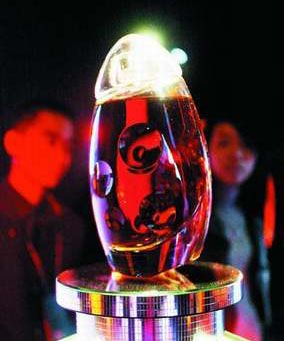China: luxury goods' new continent?
By Li Qian (Chinadaily.com.cn)Updated: 2006-12-27 11:36
Two world-class luxury goods exhibitions concluded last week in the neighboring cities of Guangzhou and Shenzhen, causing the public to wonder if China has become rich enough to pay sky-high prices for luxury items.
In 2005 and 2006, Top Marques exhibitions were held twice in Shanghai, the first time of the world's biggest luxury exhibition to open outside Monaco. A similar Top Show in Shenzhen ended last week with more than 100 million yuan (US$ 12.5 million) worth of goods sold, according to the organizer.
The Shenzhen exhibition featured mobile phones, selling for 100,000 yuan, decorated with crystal and gold, limousines from Bentley, Wiesmann and Spyker, a three-million-yuan table and villas in golf resorts.
A watch worth 3.8 million yuan could not scare Guangzhou magnates any more, who complained the items on show at the Guangzhou luxury exhibition were plain to see.
 A bottle of Hennessy Ellinse Cognac worth 40,000 yuan is displayed on the Top Show, a luxury goods exhibition in Shenzhen December 17. [Information Times]  |
The fast-expanding wealthy classes in two of China's major economic regions, the Yangtze River Delta and the Pearl River Delta, have begun competing in leading China's luxury goods consumption.
In the meantime, the thrift practiced by Chinese people during hard times is losing its strength as a virtue, while the pursuit of luxury goods is not seen as evil, but now a thing to be applauded.
A German businessman promoting porcelain tableware worth 10,000 Euros at the Guangzhou luxury show said he believes China's burgeoning millionaires "need these expensive items to prove that they are of the same class as the rich in Europe".
China's luxury goods market, the third largest after the US and Japan, is currently at US$ 2 billion, and is increasing by 20 percent annually, according to market reports from Ernst & Young.
"No one doubts China will become the biggest buyer of luxury goods," the Economic Information Daily quoted Liu Jidong, an organizer of last week's Guangzhou luxury exhibition, as saying.
Liu told the paper the bank deposits of citizens in the Pearl River Delta alone has hit two trillion yuan, reflecting the huge potential of luxurious items consumption in China.
The sky-high prices displayed at the exhibitions, the increasing number of fashion salons and luxury brand stores that encourage extravagant lifestyles are confusing people and causing them to forget that there are still tens of millions of people in China struggling for food.
Homeless people from rural areas sit in the shadows of Shanghai skyscrapers, and a large number of people living in cities save all their lives but are still unable to buy an apartment.
Luxury magnifies the enormous disparity between the rich and poor. The cost of luxury consumption that is already fairly common in Europe and America still seems too expensive for China.
China began learning from the US and other countries, which already have a mature taxation system in order to curb barbaric luxury consumption. In April 2006, yachts, golf products, slap-up watches and other expensive merchandise were added to the luxury consumption tax list in China, which was still far from satisfactory according to some economists. High taxes are not imposed on private planes, luxury houses or top-grade furniture.
People expect a more consummate tax system will be implemented to balance the disparity in social incomes and clamp down on conspicuous consumption.
As Chinese magnates spend big bucks supporting their extravagant lifestyles, the concept of a healthy and sustainable lifestyle, one that stresses the importance of the physical and mental health of all living things, which cannot be achieved by spending a lot of money, is catching on in the US.
|
||
|
||
|
|